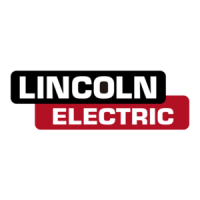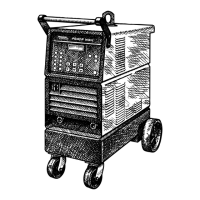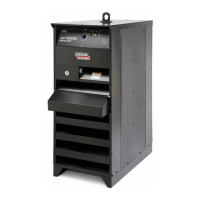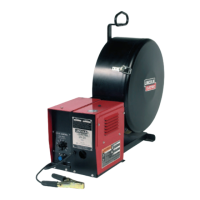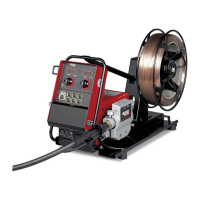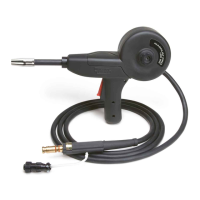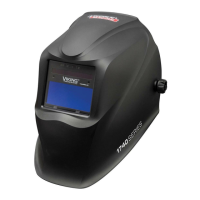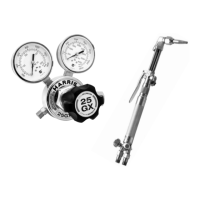Do you have a question about the Lincoln Electric INNERSHIELD Series and is the answer not in the manual?
Warnings about chemicals known to cause cancer, birth defects, and reproductive harm.
General safety advice for welding operations, emphasizing qualified personnel and reading manuals.
Safety guidelines for operating and maintaining engine-powered welding equipment.
Information on potential dangers of EMF and procedures to minimize exposure during welding.
Safety measures to prevent electric shock, including proper insulation and dry conditions.
Additional safety precautions for preventing electric shock in hazardous conditions.
Protective measures against arc rays, including eye and skin protection.
Hazards associated with welding fumes and gases and necessary precautions for ventilation and respiratory protection.
Risks of fire and explosion from welding sparks and measures to prevent them.
Further precautions regarding sparks, work cable connections, and fire prevention.
Guidelines for safe handling and positioning of compressed gas cylinders to prevent explosions.
Continued safety instructions for compressed gas cylinders, including valve protection and reading instructions.
Safety measures for electrically powered equipment, including power disconnection and grounding.
Explanation of the Innershield arc welding process using continuously fed tubular wire with internal shielding agents.
Key features of Innershield, including wind resistance, no gas bottles, and stiff wire.
Benefits compared to gas-shielded and stick welding, focusing on cost and efficiency.
Limits on seismic applications, thickness, single-pass, and electrode exposure.
Limitations on intermixing, tack welding, aging, and arc gouging.
Guide to selecting the appropriate Innershield gun based on amperage, duty cycle, and wire size.
Instructions for cleaning the weld joint and preparing the work area for welding.
Tips for ensuring proper wire feeding, including cable handling and maintenance.
Setting Contact Tip to Work Distance and optimizing wire feeding for optimal welds.
Setting WFS, starting arc, voltage, and travel speed for effective welding.
Handling fitup, drag angle, wire angles, and vertical welding methods.
Guidelines for working with NS-3M wire and specific techniques.
Solutions for common welding problems like porosity, convex beads, spatter, and poor penetration.
Techniques to prevent arc blow and stubbing during welding operations.
How changes in arc voltage and wire feed speed affect weld quality and appearance.
Impact of travel speed and CTWD variations on welding current, arc voltage, and bead characteristics.
Steps and conditions for performing welder qualification tests, including preheat and aging.
Guidelines for storing Innershield electrodes in unopened packages to maintain quality and prevent moisture.
Specific storage requirements for Innershield electrodes with stricter hydrogen control, including packaging.
Welding parameters for NR-211-MP on 14 GA and 10 GA plate for various positions.
Welding parameters for NR-211-MP on 16 GA and 12 GA plate for various positions.
Procedures for NR-232 .068" in vertical up and overhead butt welds with open root.
Procedures for NR-232 .068" in flat and horizontal fillet welds on various plate sizes.
Welding parameters for NR-232 .068" in all position fillet welds for different leg sizes.
Procedures for NR-232 .068" in vertical up and overhead butt welds with steel backup.
Procedures for NR-232 .068" in flat and horizontal butt welds for various plate sizes and passes.
Welding parameters for NR-232 .072" in all position fillet welds for different plate and leg sizes.
Procedures for NR-232 .072" in vertical up and overhead butt welds with open root.
Procedures for NR-232 .072" in vertical up and overhead butt welds with steel backup.
Welding parameters for NR-232 .072" in flat and horizontal fillet welds.
Procedures for NR-232 .072" in flat and horizontal butt welds for various plate sizes and passes.
Welding parameters for NR-232 5/64" in all position fillet welds.
Procedures for NR-232 5/64" in flat and horizontal fillet welds.
Procedures for NR-232 5/64" in flat and horizontal butt welds.
Procedures for NR-232 5/64" in vertical up butt welds with open root.
Procedures for NR-232 5/64" in vertical up and overhead butt welds with steel backup.
Operating parameters for .120", 5/32", 3/32" NR-1, NR-5, NR-131, NR-152 electrodes.
Operating parameters for NR-202, NR-203MP, NR-203 Ni, NR-207 electrodes.
Operating parameters for NR-211-MP and NR-212 electrodes across various sizes.
Operating parameters for NR-232, NR-305, and NR-311 electrodes across various sizes.
Operating parameters for NS-3M Innershield wires, including various sizes and types.
General guidelines for operating procedures, emphasizing parameter adjustments and contacting distributors.
Drawings and part numbers for components of K126 and K206 Innershield guns.
Drawings and part numbers for components of K115, K116, and K289 Innershield guns.
Part numbers for contact tips and gun tubes for various Innershield gun models.
Details about Lincoln Electric's welding school, including contact information and course offerings.
List of specialized welding courses offered, including pipe welding, fillet tests, and inspector courses.
A section for general notes or remarks.
Information regarding test results for mechanical properties, composition, and hydrogen levels.
Lincoln Electric's policy on providing advice and information to customers regarding product use.
| Series | INNERSHIELD |
|---|---|
| Welding Process | FCAW (Flux-Cored Arc Welding) |
| Shielding Gas | Self-Shielded (No external gas required) |
| Polarity | DCEN (Direct Current Electrode Negative) |
| Product Type | Flux-Cored Wire |
| AWS Classification | E71T-11, E71T-GS |
| Diameter | 0.030 in. (0.8 mm), 0.035 in. (0.9 mm), 0.045 in. (1.1 mm) |
| Spool Sizes | 1 lb, 2 lb, 10 lb, 25 lb |
| Applications | General Fabrication |
